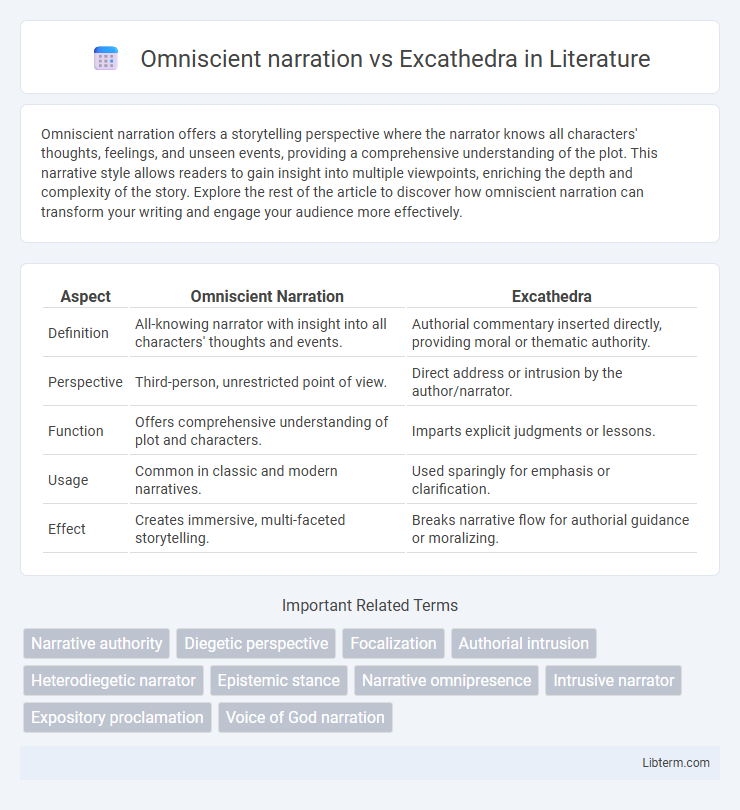Omniscient narration offers a storytelling perspective where the narrator knows all characters' thoughts, feelings, and unseen events, providing a comprehensive understanding of the plot. This narrative style allows readers to gain insight into multiple viewpoints, enriching the depth and complexity of the story. Explore the rest of the article to discover how omniscient narration can transform your writing and engage your audience more effectively.
Table of Comparison
| Aspect | Omniscient Narration | Excathedra |
|---|---|---|
| Definition | All-knowing narrator with insight into all characters' thoughts and events. | Authorial commentary inserted directly, providing moral or thematic authority. |
| Perspective | Third-person, unrestricted point of view. | Direct address or intrusion by the author/narrator. |
| Function | Offers comprehensive understanding of plot and characters. | Imparts explicit judgments or lessons. |
| Usage | Common in classic and modern narratives. | Used sparingly for emphasis or clarification. |
| Effect | Creates immersive, multi-faceted storytelling. | Breaks narrative flow for authorial guidance or moralizing. |
Understanding Omniscient Narration: A Definition
Omniscient narration is a narrative mode where an all-knowing narrator provides insight into the thoughts, feelings, and motivations of multiple characters, offering a comprehensive view of the story's events. This narration allows for shifting perspectives and a broader understanding of plot dynamics without being confined to a single character's knowledge. Unlike ex cathedra statements, which are authoritative and doctrinal pronouncements delivered with unchallengeable certainty, omniscient narration maintains narrative flexibility and subtlety in conveying information.
What Does "Ex Cathedra" Mean in Literature?
Ex cathedra in literature refers to a narrative style where the author presents information with authoritative certainty, as if delivering an infallible pronouncement. This contrasts with omniscient narration, which offers a comprehensive, all-knowing perspective but allows for subjective interpretation and varied character insights. Ex cathedra statements function as explicit, unequivocal truths directly imposed by the narrator, shaping the reader's understanding unambiguously.
Key Differences Between Omniscient Narration and Ex Cathedra
Omniscient narration offers a storytelling perspective where the narrator possesses complete knowledge of all characters' thoughts, experiences, and actions, providing a comprehensive view of the narrative world. Ex cathedra, in contrast, refers to authoritative pronouncements typically used in religious or institutional contexts, signifying statements made with infallible authority without debate. The key difference lies in omniscient narration's function as a literary technique that guides readers through a story with full insight, while ex cathedra represents authoritative declarations that demand acceptance based on the speaker's institutional power rather than narrative omnipresence.
The History and Evolution of Omniscient Narration
Omniscient narration, originating in ancient epics and classical literature, evolved through the Renaissance and Enlightenment periods, where it gained prominence as a narrative voice that provides an all-knowing perspective on characters and events. Unlike ex cathedra statements, which denote authoritative, infallible declarations typically used in religious or formal contexts, omniscient narration offers a comprehensive but interpretive viewpoint within literary storytelling. The evolution of omniscient narration reflects changes in literary styles and reader expectations, shifting from a rigid, authoritative tone to more nuanced and varied uses in modern and postmodern literature.
The Roots of Ex Cathedra Authority in Writing
Ex Cathedra authority in writing traces its roots to the concept of infallible pronouncements made from a position of unquestionable expertise, often linked to religious or doctrinal contexts where absolute truth is declared without ambiguity. Unlike omniscient narration, which offers a comprehensive and all-knowing perspective that can reveal multiple viewpoints and internal thoughts, Ex Cathedra asserts a singular, definitive voice that demands acceptance. This authoritative stance originates from institutional power structures that prioritize doctrinal certainty over narrative plurality, reinforcing the writer's unchallengeable credibility.
Common Uses of Omniscient Narrators in Fiction
Omniscient narrators in fiction commonly provide comprehensive insights into multiple characters' thoughts and emotions, creating a broad and deep narrative scope. This narrative style frequently appears in classic literature and epic tales, where understanding diverse perspectives enhances thematic complexity. In contrast, ex cathedra narration delivers authoritative, often didactic commentary, less focused on character interiority and more on imparting specific knowledge or moral lessons.
The Impact of Ex Cathedra Voice on Reader Perception
Ex Cathedra voice shapes reader perception by presenting information with authoritative certainty, often limiting narrative ambiguity and guiding interpretations directly. Unlike omniscient narration, which offers a comprehensive, multi-faceted view of characters and events, Ex Cathedra imposes a singular, infallible perspective that can enhance persuasion but reduce narrative complexity. This authoritative narrative style influences reader trust and engagement by emphasizing the narrator's credibility and control over the story's truth.
Pros and Cons of Omniscient Narration
Omniscient narration offers a comprehensive perspective by revealing multiple characters' thoughts and broader context, enhancing narrative depth and complexity. However, this narrative style can lead to information overload, making it challenging for readers to maintain focus and emotional connection with individual characters. The flexibility of omniscient narration allows for seamless shifts between scenes and timeframes, but it risks reducing suspense and diminishing the impact of subjective character experiences.
When to Use Ex Cathedra vs Omniscient Narration
Ex Cathedra narration is ideal when conveying authoritative, unchallengeable statements, typically used in religious or formal contexts where the narrator assumes a position of infallible knowledge. Omniscient narration suits storytelling that requires a comprehensive understanding of all characters' thoughts, emotions, and events, providing a broad narrative scope and depth. Choose Ex Cathedra to assert definitive truth or doctrine, while omniscient narration is better for explorative, multi-perspective storytelling.
Famous Examples: Omniscient Narrators and Ex Cathedra Voices in Literature
Famous examples of omniscient narrators include the all-knowing voice in Leo Tolstoy's *War and Peace* and the shifting perspectives of the narrator in Jane Austen's *Emma*, revealing inner thoughts and broader societal insights simultaneously. Excathedra voices appear prominently in didactic literature such as John Bunyan's *The Pilgrim's Progress* where the narrator's authoritative, moral proclamations guide the reader's interpretation. Both narrative styles shape reader engagement by controlling access to knowledge, with omniscient narration offering a panoramic view and ex cathedra voices asserting unchallengeable authority.
Omniscient narration Infographic

 libterm.com
libterm.com